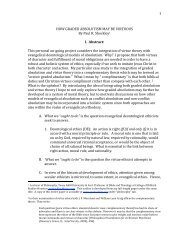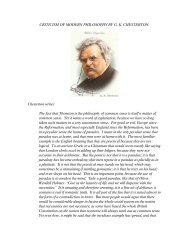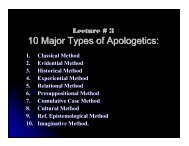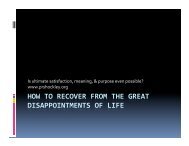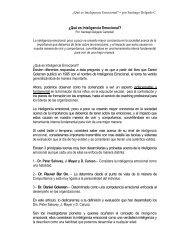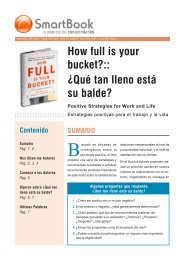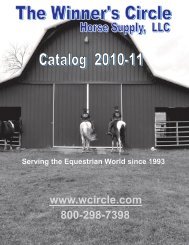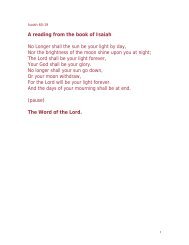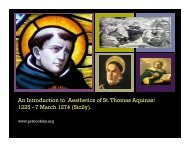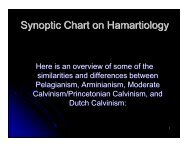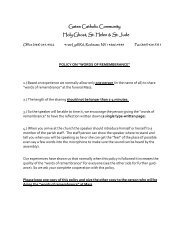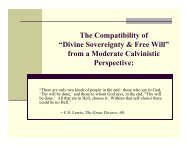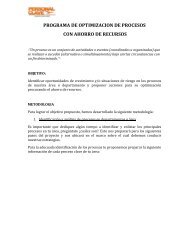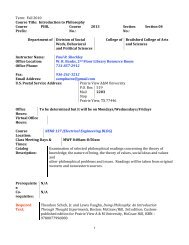- Page 1 and 2: ReneDescartes1596-1650Caravaggio,
- Page 3 and 4: Rene Descartes(1596-1650):When our
- Page 5 and 6: I. Background:Educated at a Jesuit
- Page 7 and 8: I. Background:1644 Descartes publis
- Page 9 and 10: I. I. The Search for Intellectual C
- Page 11 and 12: II. Descartes’ Goal:Lay the found
- Page 13 and 14: Method: The Need for the Meditation
- Page 15 and 16: Descartes’ Method:Knowledge Requi
- Page 17: II. Descartes’ Plan:His ideal was
- Page 21 and 22: D. Rules of Method:Descartes’ met
- Page 23 and 24: II.Descartes’ Method:Looking for
- Page 25 and 26: Little emphasis on on sense experie
- Page 27 and 28: First Meditation: Arguments forDoub
- Page 29 and 30: Grounds of Doubt: First Meditation:
- Page 31 and 32: III. Method:Method: It is a radical
- Page 33 and 34: Consider the following statements b
- Page 35 and 36: First Meditation:Withholding Policy
- Page 37 and 38: V. The Order of Systematic Attack:C
- Page 39 and 40: Objectors (2, 3, and 4 are the most
- Page 41 and 42: 1. Doubting Sense Perception:Someti
- Page 43 and 44: 2. Dreaming:Another ground of doubt
- Page 45 and 46: 2. Dreaming:No inspection of the co
- Page 47 and 48: 4. The Evil Deceiver:Can we be sure
- Page 49 and 50: 4. Evil Demon:Because of the evilde
- Page 51 and 52: Consider the following statements b
- Page 53 and 54: Meditation 2 Outline: Cogito: The N
- Page 55 and 56: Descartes’ Reasoning:Descartes th
- Page 57 and 58: What Descartes Establishes:Descarte
- Page 59 and 60: Meditation 2: Cogito:The Cogito:
- Page 61 and 62: Meditation 2: Problems with CogitoP
- Page 63 and 64: 2 ndndnd nd Meditation : : He disca
- Page 65 and 66: The Wax Passage:Transparency of the
- Page 67 and 68: Wax Wax Example Establishes Three P
- Page 69 and 70:
Consider this important statement:
- Page 71 and 72:
Descartes' Belief -Set:Believe only
- Page 73 and 74:
Third Meditation: Descartes writes
- Page 75 and 76:
Meditation 3: 3: SUMMARY OF INTRODU
- Page 77 and 78:
Criterion of Certainty:At the begin
- Page 79 and 80:
Third Meditation: What does “clea
- Page 81 and 82:
Third Meditation: What does “Natu
- Page 83 and 84:
Third Meditation: 3 Types of Ideas
- Page 85 and 86:
Objective & Formal Reality:Meditati
- Page 87 and 88:
Objective and Formal Reality:Object
- Page 89 and 90:
Formal and Objective Reality:Everyt
- Page 91 and 92:
More RealityThe reason why are infi
- Page 93 and 94:
Scholastic GreatChain of Being:1. V
- Page 95 and 96:
2 nd Causal Argument for God’s ex
- Page 97 and 98:
The Cartesian Circle:I am sure Gode
- Page 99 and 100:
Descartes Response to Arnauld regar
- Page 101 and 102:
Cartesian Circle:According to Dr. S
- Page 103 and 104:
Third Meditation: Only Ideas Called
- Page 105 and 106:
First & Second Meditation:Withholdi
- Page 107 and 108:
Descartes: Mind-Body Problem:Descar
- Page 109 and 110:
The Mind is is a Substance: A subst
- Page 111 and 112:
Descartes' Knowledge-set at end of
- Page 113 and 114:
Fourth Meditation: God is not a Dec
- Page 115 and 116:
Fourth Meditation: God is not a Dec
- Page 117 and 118:
God guarantees the truth of of all
- Page 119 and 120:
This takes us back to Cartesian Cir
- Page 121 and 122:
Meditation 4: The Possession of Fre
- Page 123 and 124:
Descartes' Knowledge-set at end of
- Page 125 and 126:
A. Considers what properties we can
- Page 127 and 128:
C. 3 Objections to Ontological Argu
- Page 129 and 130:
D. The Role of God in making Knowle
- Page 131 and 132:
Descartes' Knowledge-set in Meditat
- Page 133 and 134:
Meditation 6: The Problem ofExisten
- Page 135 and 136:
AB. The Evidence for the existence
- Page 137 and 138:
B. The Evidence for the existence o
- Page 139 and 140:
Mind is really distinct from body:I
- Page 141 and 142:
First Argument for Distinction ofMi
- Page 143 and 144:
First Argument for Mind-BodyDistinc
- Page 145 and 146:
Sense Impressions from BodilyObject
- Page 147 and 148:
Do our senses tell us the truth abo
- Page 149 and 150:
What is the relation of Mind and Bo
- Page 151 and 152:
Mind-Body Interaction:Changes in th
- Page 153 and 154:
Descartes’ Difficulty with Intera
- Page 155 and 156:
Historical Solutions to the Mind-Bo
- Page 157 and 158:
Descartes' Knowledge-set at end of
- Page 159 and 160:
Descartes' Belief -Set:Believe only
- Page 161 and 162:
Various Objections:If we can’t be



